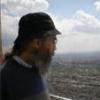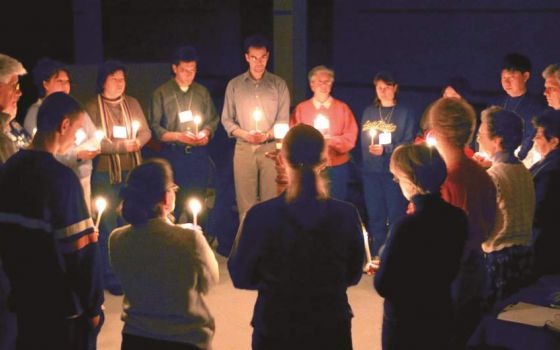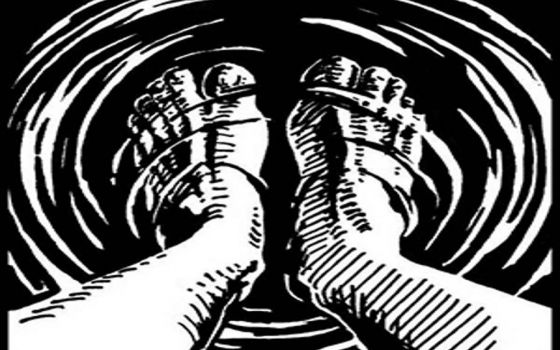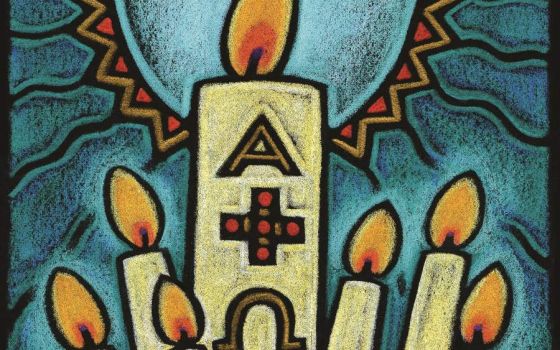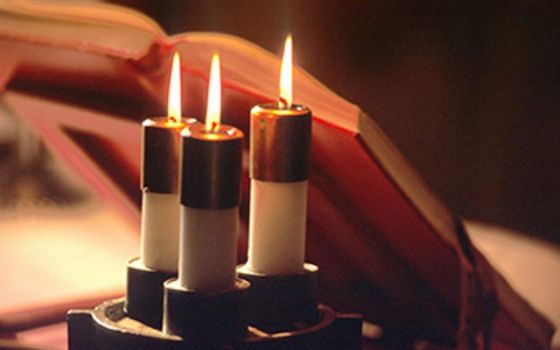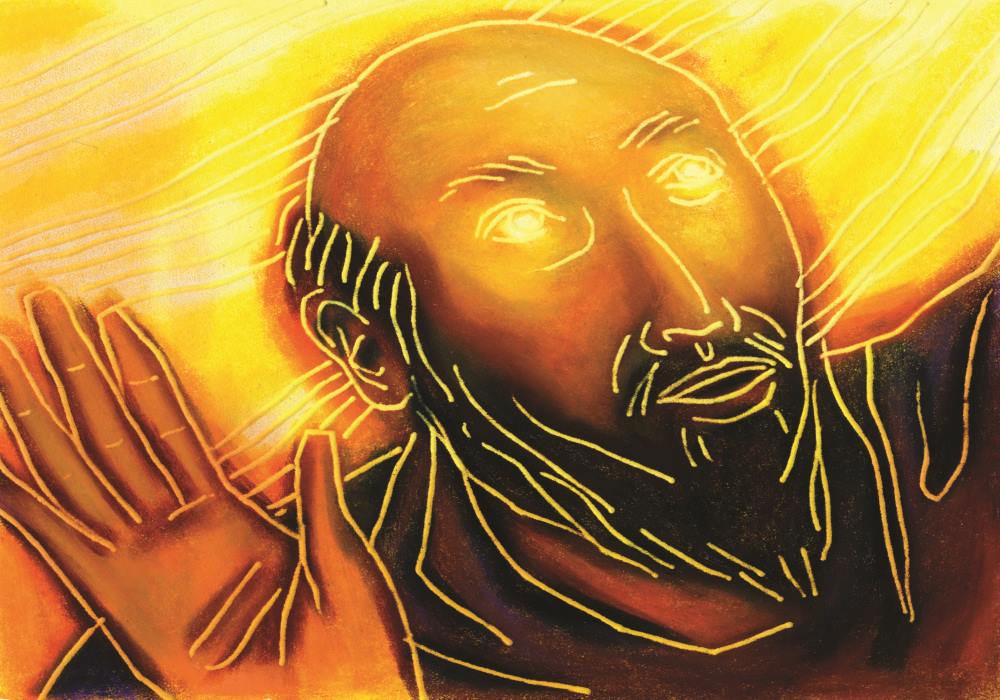
Art by Julie Lonneman
The sine qua non of a community's rituals — little ones and enormous ones — are the way they belong to all present. That is what ritual must be, whether it is this entire time between Ash Wednesday to Pentecost in the assembly's life in church and out, or simply the chanting and movement of each Sunday's procession to our holy Communion. Ritual belongs to all, needs all.
That's hard but how can we settle for less? The ritual of the great ninety days (that is, the Lent, Triduum and the Easter seasons) done by us every year, rehearses us in our love for and confrontation with the world. This is at once personal and communal. How can they ever be separated? Not in Gospel and not in ritual. Thus, we find in these rituals our church's way to grasp the Gospel and grasp also what we must do and be in our time and place.
In these rites we are brought to confront the God-loved world around us, to confront it together as assembly, to confront it as ourselves as a part of it, to know together what is glorious as well as what is ruinous. Here little by little a church comes to know its language, its song, its dance, and to know these by heart. This "knowing by heart" is how ritual engages Gospel living in this place and this time, in our excitement and in our trepidation. To what end? We can only say this: God so loved the world. That's a gospel way to tell us that this isn't going to be sweet, pretty, private, owned or ever fastened down.
A church doing its liturgy should never be subject to nifty ways or "let's do the ritual differently this year" attitudes of engaging the assembly. We must realize that we need the ritual — by definition the work of all present — as much as the ritual needs us. And it is done by heart — gradually. Like song, ritual isn't on the page. It does not aim for applause, but rather spurns applause as the deed of an audience and here there is no audience. That "no audience here" is difficult for us in a culture that seems, often for less than honorable motives, to define us (both alone and with others) as an audience.
Approach liturgy for what it is: not spectator / performer events, but rituals that can bear the repetition. Therefore, let us do our work by heart and never exhaust the ritual deed. As we may come to realize, the deed keeps us and may, at its best, exhaust us. It is something like the encounters we have, in various rhythms, with some work of art — the sound of some song or poem, the color and composition of some painting, one tiny move in a dance. Each of us could identify something inexhaustible in some of those areas. That's something like these rites of Triduum in our common experience of parish liturgy.
Ritual deeds are repeated, not for us to get each word or action perfect, but to get it deep into our bones. These deeds bear the weight of repetition. If we know that, then we know what to demand of ourselves when we do our liturgy together. But do not confuse this with schmaltz or tears. The deeds of the Triduum — feet washed and kissed, a Friday rite of intercession and then approaching the cross to touch or to kiss or to prostrate oneself, the longtime tradition of listening to Scripture and responding in psalms and canticles in the middle of that night between Saturday and Sunday — are not watched but enacted by each and by the assembled. Thus, as has been said: We do the rite and the rite does us. And so, within the assembly, the church "lives and moves and has its being."
Why is this year different?
I think we must ponder our paschal rituals this year as never before. I do not say that because of the outcome of the presidential election. That only sharpened our awareness of some facets of our society. It has heightened our sense of what is deeply wrong and exposed our need to grapple with these times. This is not new. Believers — and not only Christian believers — have long been divided about their responsibility to judge and act. Some in the community say the path to God does not require taking on the social and political struggle. Others say that such a struggle is exactly what we are to do in the name of justice. Jeremiah 20:9 is frightening: "If I say, ‘I will not speak any more in God's name,' then within me there is something like a burning fire shut up in my bones; I am weary with holding it in, and I cannot" (paraphrased from NRSV). Consider also words and actions of other prophets: Elijah, Thekla, Dorothy Day, Dr. King, Oscar Romero, Catherine of Siena and Sor Juana.
Our rites of Sunday and of the seasons are not done in some holy vacuum that separates them from the terrors and the violence of our day. Whatever the origin of Mary's Magnificat, Luke's Gospel didn't shy away from the song boldly put on her lips. What now? A message often heard, inside the church and out, is that nothing matters more than American (or American and European) lives and well-being and that these lives are under threat. What matters more than anything else, is that we accept a sort of doctrine that our lives matter more than their lives. This is about policing and military budgets, it is about race, it is about the contemporary image called terrorist. What can we do to protect ourselves? Arm yourself and shoot first. These last decades have moved us toward that both as foreign policy and as a way to divide the good guys from the bad guys inside the U.S. borders. It is working. It is working for demagogues, and it is working for the wealthy and the military budget. And, somehow, it turns out that if you set up such fears and such anger, it fills so much space we have no energy left to keep the ice from melting.
Don't bother us with outrage. One by one we think these struggles are beyond our understanding and we're just too busy with keeping up. What can one person, family, parish do about the fuels we burn? How can we say the country doesn't need some fantastic new fighter plane, or drone, or warship or jamming equipment? What do I know?
Advertisement
In 1967, a year before he was assassinated, Martin Luther King said that he could be silent no longer about Vietnam, but would speak the truth. He said, "The greatest purveyor of violence in the world: My own government. I cannot be silent." Nor can I, nor can you.
What then do we carry into this paschal time in a year when violence has become our country's way to deal with the larger world? Now we come face to face with more than our own sins, but to those we allow, to what we have done and what we have paid for. We have not asked questions, especially the ever-vital cui bono? — who profits? — for example, when those new pipelines tear apart our communities. What kind of horror should we feel that we made it necessary for those native American water protectors to put their bodies in the way in the way of the Dakota Access Pipeline? Where were we? Where are our Catholic church leaders? If Laudato Si' had been about abortion we'd hear about it all the time.
So can we have life as usual this year, this paschal season? We're challenged at whatever level — parish, religious order, university — to look at our lives and make room for movement, study, discussion, organizing, re-setting priorities. And this challenge is right in plain sight: the very deeds of Triduum.
Washing each other's feet
Parishes where all participate seem more common now. Parishes where those who come forward barefoot to have their feet (both) washed, then kneel and wash the feet of someone else, wash and kiss their feet. It is, even if done but once a year as entrance to the Triduum, a serious and solemn and often lengthy time. In a dozen places in a crowded church barefoot people are washing the bare feet of someone they know or don't know. It is what it is. It needs no explanation, only invitation and perhaps a brief unfolding by one who understands. And simple but eloquent by-heart refrains to be sung through the time.
The question is: How manifest the vast implications of this deed in the life of this local church? The washing, humbling and unfathomable; the water, present on Thursday night as it will be in the stories told Friday and at the Vigil and in baptismal immersion of infants and adults; the kiss — we only need read the Alan Paton text in the sidebar. This is who we are and hope to be.
Praying to open our eyes
We do not keep track of time in Triduum. When we gather Good Friday, two moments are important: intercession and veneration of the cross. What are we naming, lifting up, voicing aloud in our prayer? And what is its rhythm and posture? Why does it matter that we remember and name what's broken, hard, unfair, hopeless? Here in our neighborhood but even more in the circles of power, both economic and military. Avoid the dreadful "that" (as in, "We pray for the sick and dying that God will ... "). Just pray and let the response be sung. And let it go on, back and forth, a litany. Who is asking for justice, who is demanding justice? Think of the widow and the unjust judge. Think of how much of the world we are blind to — and pray we open our eyes. Pray like that widow!
This extended litany readies us to approach the cross. It isn't efficient, but, here again, we're on the move.
Editor's note: This reflection was originally published in the February 2018 issue of Celebration. Sign up to receive daily Lenten reflections.
